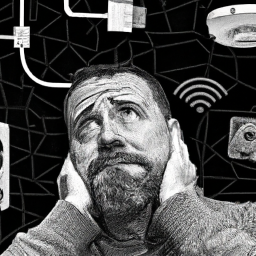
Have you ever wondered what kind of support is available if your smart home devices suddenly stop working? It can be frustrating when the devices you rely on for automation and convenience suddenly stop functioning properly. In this article, we will explore the different types of support that are available to help troubleshoot and fix any problems you may encounter with your smart home devices. Whether it’s a malfunctioning smart thermostat, a glitchy smart lighting system, or an unresponsive smart security camera, we will discuss the various avenues you can explore to get your devices back up and running smoothly. So, if you’re facing any issues with your smart home devices, keep reading to find out what kind of support is available to you.
Curious to know what kind of support options are available if your smart home devices stop working? Well, look no further! This article aims to provide you with detailed information on the different types of support that you can seek when faced with problems or malfunctions in your smart home devices. From contacting the device manufacturer for technical assistance to seeking help from professional installers or consulting online forums and communities, we will cover all the key support avenues that can help you troubleshoot and resolve any issues you may encounter. So, if you’re facing any problems with your smart home devices and want to know how to get them back up and running smoothly, the answers await you in this article!
Types of Smart Home Devices
Smart Thermostats
Smart thermostats are devices that allow you to control the temperature of your home remotely. They can learn your preferences and adjust the temperature accordingly, saving you energy and money. If your smart thermostat stops working, there are various support options available to help you troubleshoot and resolve the issue.
Smart Security Cameras
Smart security cameras provide an extra layer of protection for your home, allowing you to monitor your surroundings from anywhere. If you experience any problems with your smart security cameras, there are support services available to assist you in identifying and resolving the issue.
Smart Locks
Smart locks offer convenience and enhanced security for your home. With the ability to lock and unlock your doors remotely, you can control who has access to your home. If your smart lock malfunctions or stops working, there are support channels you can turn to for help.
Smart Lighting
Smart lighting systems allow you to control the lighting in your home using your smartphone or voice commands. These systems offer flexibility and convenience, but if you encounter any issues with your smart lights, there are support options available to help you troubleshoot and fix the problem.
Common Issues with Smart Home Devices
Connection Problems
One common issue faced by smart home device users is connection problems. Smart devices rely on a consistent and stable internet connection to function properly. If your smart home devices are experiencing connectivity issues, there are steps you can take to troubleshoot the problem. Online troubleshooting guides provided by the manufacturers can help you identify the source of the issue and provide possible solutions.
Failed Setup
Setting up smart home devices can sometimes be challenging and may result in a failed setup. This can be frustrating, especially if you are new to smart home technology. Most manufacturers provide detailed setup instructions and troubleshooting guides to assist with the installation process. If you are unable to resolve the issue on your own, you can seek support through customer support hotlines or live chat support.
Software Glitches
Smart home devices rely on software to function optimally. However, like any software, glitches and bugs can occasionally occur. If your smart home device is not working as expected due to a software glitch, you can contact the manufacturer’s support channels for assistance. They may be able to provide troubleshooting steps or even release a software update to fix the issue.
Compatibility Issues
Compatibility issues can arise when trying to integrate smart home devices from different manufacturers or when using older devices with newer technology. If you are experiencing compatibility issues with your smart home devices, there are support services available. Smart home technology consultants can provide guidance on compatibility and recommend solutions to ensure all your devices work together seamlessly.
Manufacturer’s Support Channels
Online Troubleshooting Guides
Most smart home device manufacturers provide online troubleshooting guides on their websites. These guides offer step-by-step instructions on how to resolve common issues with their products. If you encounter any problems with your smart home devices, consulting the manufacturer’s online troubleshooting guide is a good first step.
Customer Support Hotline
Many manufacturers offer customer support hotlines that you can call for technical assistance. These hotlines are staffed by support agents who can help troubleshoot and resolve issues with your smart home devices. They can provide personalized assistance and guide you through the troubleshooting process.
Live Chat Support
Some manufacturers provide live chat support on their websites. This allows you to communicate with support agents in real-time, providing you with immediate assistance. Live chat support can be convenient and efficient, as you can easily communicate your issues and receive troubleshooting steps without having to make a phone call.
Email Support
If you prefer written communication, some manufacturers also offer email support. You can send a detailed description of the issue you’re experiencing with your smart home devices, and the support team will respond with troubleshooting steps or further assistance. Email support allows you to keep a record of your conversation and reference it in the future if needed.
Warranty and Repair Options
Manufacturer’s Warranty
Most smart home devices come with a manufacturer’s warranty, which covers manufacturing defects and malfunctions within a certain period. If your smart home device stops working within the warranty period, you can contact the manufacturer for a repair or replacement. It’s important to keep your proof of purchase and follow the warranty terms and conditions to ensure eligibility for warranty support.
Extended Warranty Services
In addition to the manufacturer’s warranty, you may have the option to purchase an extended warranty for your smart home devices. Extended warranty services provide additional coverage after the manufacturer’s warranty expires, giving you peace of mind in case of any future issues. It’s worth considering if you want extra protection for your devices.
Device Repair Centers
If your smart home device is no longer covered under warranty or you prefer to have it repaired locally, you can visit device repair centers. These centers specialize in repairing electronic devices, including smart home devices. They have the knowledge and expertise to diagnose and fix various issues, ranging from hardware problems to software glitches.
Third-Party Support Services
Smart Home Device Retailers
Smart home device retailers often provide support services beyond just selling the products. They may offer installation assistance, troubleshooting guidance, and even after-sales support. If your smart home device stops working or you need help with setup, you can reach out to the retailer for assistance.
Professional Installation Services
If you’re new to smart home technology or prefer professional assistance, you can hire professional installation services. These services can help you set up your smart home devices correctly, ensure they are working properly, and even provide additional training on how to use them effectively.
Smart Home Technology Consultants
Smart home technology consultants are experts in the field of home automation. They can offer guidance on which smart home devices to purchase, help design a customized smart home system, and provide support and troubleshooting assistance. If you want expert advice and assistance with your smart home devices, consulting a smart home technology consultant can be beneficial.
Community Support
Online Forums and Communities
Online forums and communities dedicated to smart home technology can be a valuable resource for troubleshooting and assistance. You can post questions about your smart home devices and other community members or experts can provide solutions or advice based on their experiences. Participating in these forums can help you learn from others and find solutions to your smart home device issues.
Social Media Groups
Social media platforms have various groups and communities focused on smart home technology. These groups can be great places to connect with other smart home device users, ask questions, and seek advice. Joining these groups can provide you with access to a supportive community that can help troubleshoot your smart home device issues.
User-Generated Troubleshooting Resources
Many smart home device users create and share troubleshooting resources online. These resources can be in the form of blog posts, YouTube videos, or detailed guides. Searching for user-generated troubleshooting resources specific to your smart home device can provide you with additional troubleshooting steps, tips, and tricks to resolve any issues you’re facing.
Remote Troubleshooting
Remote Access Apps
Some smart home devices have accompanying mobile apps that allow you to remotely control and troubleshoot your devices. These apps often provide diagnostic tools and troubleshooting guides to help you identify and fix issues. Using a remote access app can save you time and effort by allowing you to troubleshoot your smart home devices from anywhere.
Smart Speakers with Virtual Assistants
Smart speakers with virtual assistants, such as Amazon Echo or Google Home, can assist with troubleshooting your smart home devices. Virtual assistants like Alexa and Google Assistant can perform basic troubleshooting steps, control compatible devices, and even provide solutions to common issues. Simply voice your concern to the smart speaker, and it will assist you in resolving the problem.
Manufacturer’s Remote Troubleshooting Services
Some smart home device manufacturers offer remote troubleshooting services. With your permission, the manufacturer can remotely access your devices to diagnose and fix issues. This service can be beneficial if you’re unable to resolve the issue on your own or if the issue requires advanced technical expertise.
Smart Home Device Recycling
Manufacturer’s Device Recycling Program
When your smart home devices reach the end of their life cycle, it’s important to recycle them responsibly to minimize environmental impact. Many manufacturers have device recycling programs in place. These programs allow you to send back your old devices to be recycled properly. Recycling your smart home devices through the manufacturer’s program ensures that they are disposed of in an environmentally friendly manner.
E-waste Collection Centers
In addition to the manufacturer’s recycling programs, there are also e-waste collection centers available where you can drop off your old smart home devices. These centers specialize in collecting and recycling electronic waste, ensuring that it is safely and responsibly disposed of.
Insurance Coverage
Homeowner’s or Renter’s Insurance
Your homeowner’s or renter’s insurance may provide coverage for your smart home devices in case of damage or theft. It’s important to review your insurance policy to understand what is covered and what is excluded. Having insurance coverage can provide financial protection if your smart home devices need repair or replacement due to covered events.
Extended Device Protection Plans
Some manufacturers or retailers offer extended device protection plans for an additional cost. These plans provide coverage beyond the manufacturer’s warranty and may include benefits such as extended customer support, repairs, or even replacements. If you want extra protection for your smart home devices, consider purchasing an extended device protection plan.
Conclusion
A variety of support options are available to assist with smart home device issues. Whether you’re facing connection problems, failed setup, software glitches, or compatibility issues, there are support channels to help you troubleshoot and resolve the problem. From manufacturer’s support channels to third-party support services, exploring these options ensures the longevity and functionality of your smart home devices. Remember to utilize online troubleshooting guides, reach out to customer support hotlines or live chat support, and consider extended warranty services or professional installation services when needed. Additionally, community support, remote troubleshooting services, and device recycling programs are valuable resources to leverage. By understanding and utilizing the available support options, you can continue to enjoy the benefits of your smart home devices with confidence.
